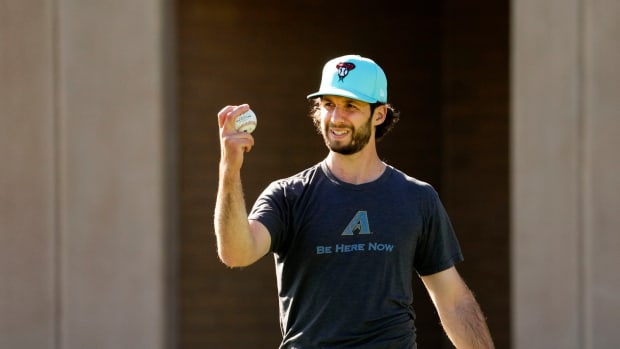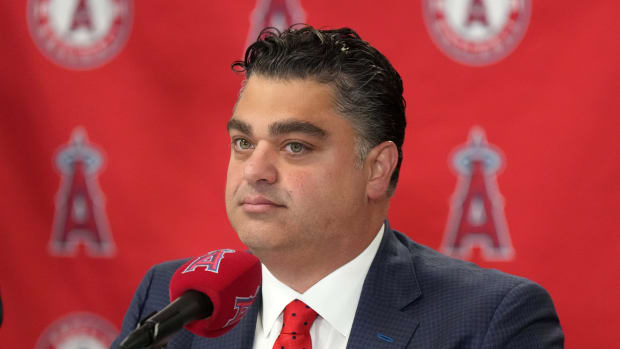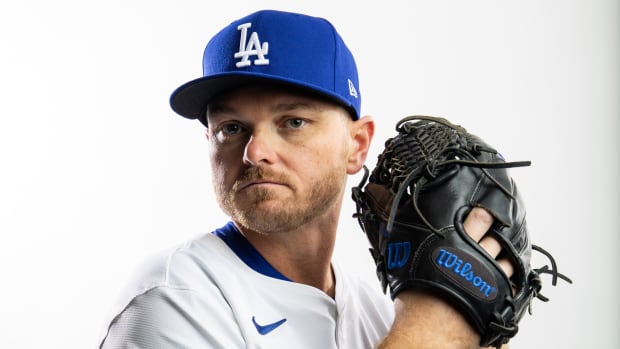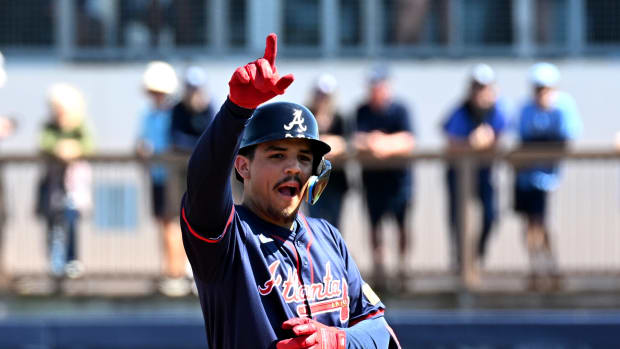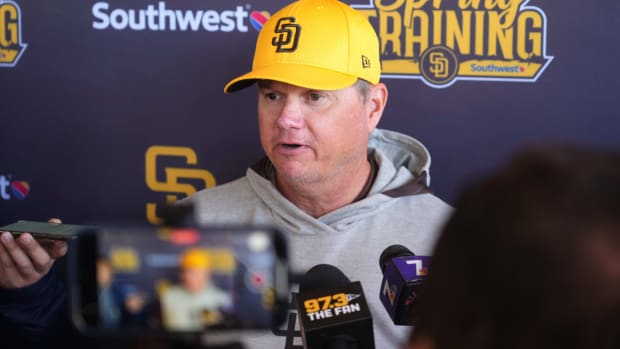Rock's road: Tim Raines on his long journey to the Baseball Hall of Fame
"It feels good but I keep telling people, 'Please don't say that I'm in!'"
Tim Raines's voice rose an octave with that plea regarding his Hall of Fame chances, just as it did when he paused a phone conversation from his home in Goodyear, Ariz., to shoo away one of his six-year old twin daughters. It was Jan. 14, four days before the voting results of the Baseball Writers Association of America were to be announced, and the 57-year-old Raines was emotionally guarded. Understandably so: This was his 10th and final year of eligibility on the writers' ballot, and he'd been stung before.
In 2014, just as Raines's candidacy was building long-overdue momentum, he received 46.1% of the vote, a drop of nearly six points from the previous cycle and the second time he’d lost ground from one year to the next. Six months after that, the Hall made a rule change that shortened the maximum amount of time candidates would appear on a ballot from 15 years to 10, costing Raines five extra chances at election.
"Either they were gonna put pressure on the writers to get me in, or they were gonna give the writers an opportunity to run me right out of town," said Raines of the rule change. "I wasn't really sure what was going to happen."
Perhaps due in part to the sudden urgency of his case, Raines's vote total jumped to 55.0% in 2015 and swelled to 69.8% in '16, just 23 votes away. Prior to this year's announcement, the early returns from among the electorate willing to make their ballots public supported him at an 89% clip, well above the 75% needed for election. But as he neared the finish line, the possibility that things could go awry was too much for him to contemplate. If he were to fall off the ballot, he would next be considered by one of the Era Committees; depending on which one he fell to, he might have been eligible as soon as 2018, but he would no longer be up for annual consideration, and those 16-man voting panels have not elected a living ex-player in 16 years.
On Tuesday night, the day before he would learn his fate, Raines got "no sleep." He spent Wednesday at home with his wife Shannon, their daughters, his in-laws and his agent, Randy Grossman, waiting for the phone to ring. Finally, that afternoon, Raines got a call from Jack O'Connell, the secretary-treasurer of the BBWAA.
He was in. After a 23-year career and a 10-year wait on the ballot, Raines got the call that every player who'd ever picked up a bat had dreamed of getting. "I don't think anyone can be as happy as I am now," a choked up Raines told Hall chairman of the board Jane Forbes Clark during that congratulatory call.
"It’s probably the first time I think anyone had seen me that kind of emotional," Raines said the next day at a press conference in New York. "Usually I'm the one that has the smile on my face, trying to get everyone else to smile about everything. Yesterday was the first time someone needed to try to get me to smile, but in the right way."
Raines had every reason to smile. He received 86.0% of the vote, well over the threshold to join a Hall of Fame class that includes former Astros first baseman Jeff Bagwell and longtime Rangers catcher Ivan Rodriguez, as well as commissioner Bud Selig and John Schuerholz, the architect of championship teams in Kansas City and Atlanta.
Raines's election is also notable for the fact that, growing up in Sanford, Fla., his first love was football. Solidly built despite his modest height of 5'8", he averaged 10.5 yards per carry and scored 18 touchdowns as a running back in his senior year, drawing over 100 college scholarship offers, including one from Florida. But while he harbored dreams of the NFL, watching the similarly compact Joe Morgan (listed at 5'7") win back-to-back National League MVP honors with the Reds in 1975 and '76 changed Raines’s focus, convincing him to give professional baseball a try first.
"Seeing things that [Morgan] did on the field were phenomenal: second baseman, hit home runs, Gold Glove," he recalled on Thursday. Drafted in the fifth round by the Expos in 1977, Raines too played second base in the minor leagues, but he knew his defense was inadequate. "I felt like I was a decent second baseman," he said last Saturday. "But I wasn't a big league second baseman.”
Raines got his first big league cup of coffee in 1979, called up five days shy of his 20th birthday to serve exclusively as a pinch-runner while the Expos battled the Pirates for the NL East flag (they fell short by two games). That was the first of his 23 seasons in the major leagues, a run that ended more than two decades later with a team not yet in existence when he debuted. He accumulated 2,605 hits, scored 1,571 runs and stole 808 bases, the latter the fifth-highest total of all time. What’s more, his 84.7% success rate is tops among players with at least 400 stolen base attempts.
Though he won The Sporting News Minor League Player of the Year Award for his 1980 season at Triple A Denver, Raines’s skills were an imperfect fit with the Expos. With leftfielder Ron LeFlore—who had swiped an NL-high 97 bases that year—departing as a free agent after the 1980 season, Montreal needed a leadoff hitter more than it needed a second baseman. The team converted Raines on the fly in the spring of 1981, a move that freed him up to focus more on his offense and in particular his blazing speed. Sure enough, in '81, he was successful in his first 27 stolen base attempts before being caught.
"I tried not to anticipate what a guy was gonna do, I just tried to react to what the guy was doing as quickly as I could see it," he said. "My football background helped, because on offense we couldn't move until 'hike!' I couldn't react one way or another until a pitcher made his move, and the quicker I saw that, the better I became. With my speed, all I had to do was get a decent jump. With a great jump I felt like no one could throw me out."
Hall of Fame five-year outlook: Bonds, Clemens, Jeter, Ortiz among players to watch
In that strike-shortened season, Raines led the NL in steals with 71, batted .304 and made his first All-Star team, helping the Expos to their lone playoff appearance. He would top the NL in steals each of the next three years as well, and he ranked first in the league in runs in 1983 and '87, in doubles in '84 and in on-base percentage in '86, the same year he won the batting title by hitting .334.
Raines reached free agency after that 1986 season, but the man Pete Rose had called "the best player in the National League" two years earlier found nothing but low-ball offers. The owners were engaging in a collusion scandal that several years later would eventually cost them a $280 million judgment, but that did little good for Raines as he languished without an offer to match his skills. Under the rules of the time, players could not re-sign with their current team from Jan. 8 through April 30, so by the time Raines was eligible to do so, on May 1, 1987, he agreed to a three-year, $5 million contract with Montreal.
After just one day of extended spring training, Raines joined the Expos the next afternoon for a nationally televised NBC Game of the Week against the defending World Series champion Mets at Shea Stadium. It became the stuff of legend, and may have done more to elevate Raines in the Cooperstown conversation than one May game ever did for another player. In the first inning, against hard-throwing rookie David Cone, he laced a first-pitch fastball off the rightfield wall for a triple. In the third inning, he walked, stole second and scored on a single. In the sixth, he singled again, and in the ninth, he sparked a game-tying rally by beating out an infield hit. Finally, in the 10th inning, he smashed a game-winning grand slam to conclude a 4-for-5 day. For good measure, he homered in his first at-bat the next afternoon as well and hit .450 in his first five games back.
"I'm not totally sure, but that is probably the only Game of the Week that I remember even having [as an Expo]," he said. "Playing in Montreal, the only chance you had to see us was either you go to Montreal, or maybe the we'd play the Braves on TBS or the Cubs on WGN. New York, you might see some games, but that was the only chance to see the Expos."
Raines made his seventh straight All-Star team that year and came off the bench to go 3-for-3 with a stolen base and the game-winning two-run triple in the 13th inning, earning him MVP honors. He finished the '87 season with career highs in home runs (18), RBIs (68), on-base percentage (.429) and slugging percentage (.526) to go with 50 stolen bases and a .330 batting average.
By that time, Raines's brilliance was clear to all, but one man in particular had been singing his praises for years. In 1982, Bill James, the author of the annual Baseball Abstract series, recognized Raines as the top offensive leftfielder in the game. A year later, James acknowledged him as the NL's best leadoff hitter; in '86 he called him "clearly the greatest lead-off man in National League history." In '87, he wrote that Raines was "a deserving recipient of the [1986] National League Most Valuable Player Award" (which had gone to Mike Schmidt), and in '88, James rated him the second-best player in baseball after fellow future Hall of Famer Wade Boggs.
What James emphasized was Raines's elite ability to get on base—simply put, to avoid making outs—and advance himself under his own power with extreme precision. Raines posted a .396 on-base percentage from 1981 to '87, tied with Keith Hernandez for third in the majors behind Boggs (.439) and Rickey Henderson (.401), and he stole bases with an 87% success rate, six points ahead of Henderson.
Why the Nationals' Trea Turner may be the next Tim Raines
In 1988, Raines stole a career-low 33 bases because he missed 53 games due to shoulder injuries that were a result of his intense style of play. "The pounding of the running and the sliding and the playing the outfield every day, that caught up with me,” he said, eschewing the opportunity to complain about what amounted to playing upon concrete spray-painted green in Montreal’s Olympic Stadium.
The daily pounding and the Expos' inability to make it back to the postseason led Raines to contemplate his baseball mortality. "I already had 13 years so I felt like, time is running out," he said. "I had to make a decision: Do I stay here and not be concerned about winning a world championship or..."
Ultimately, Raines and agent Tom Reich worked with the Expos to engineer a trade to the White Sox in December 1990, agreeing to a three-year, $10 million extension in the process. "I didn't leave because I wanted to get out of Montreal," he said. "I left because I wanted a chance to win a championship."
In five solid but unspectacular seasons with Chicago, the closest he got to a World Series was the 1993 AL West title, and though he had a spectacular ALCS—leading all players with a .444 average and 12 hits—the White Sox lost to the defending and soon-to-be world champion Blue Jays in six games. In December 1995, Raines agreed to a restructuring of his contract and a trade to the Yankees, who had just reached the postseason for the first time since 1981. A broken finger and a hamstring strain limited him to 59 games in '96, but he returned to hit seven home runs and slug .595 in September. "I was practically the reason why we ended up going to the playoffs," he said. "Down the stretch, I did my best work. I didn't steal many bases that year, but I found other ways to help the team win a game."
That was especially true in the pivotal Game 4 of that year's World Series. Trailing 2–1 in the series, New York had climbed out of a 6–0 hole and sent the game into extra innings. In the 10th, Raines ignited a rally by drawing a two-out walk, went to second on a Derek Jeter infield single and to third on an intentional walk to Bernie Williams, then scored the game-winning run when Boggs worked a bases-loaded walk. In the bottom of the inning, he caught two fly balls on the warning track, tripping while catching Terry Pendleton's line drive for the final out.
Two games later, the Yankees won their first title in 18 years. "I don't think there was any other guy on that team that was more excited about that moment," he said. "I could have given away all the stolen base titles, the All-Star Games, all of that stuff, to win a world championship."
Raines remained a valuable part-time outfielder for the Yankees for two more seasons, hitting .304, but he was left off the 1998 World Series roster and moved on to the Athletics in 1999. He then bounced among four more teams—including a 47-game return engagement with Montreal and a chance to play with his son Tim Jr. for the Orioles, both in 2001—before retiring after the '02 season. At that time, a berth in Cooperstown wasn't initially on his mind.
"When I first retired, I didn't even think about the Hall of Fame," he said. "I knew that after five years, you're eligible, but when those five years came up, I had forgotten all about it. Then when the votes came in and I saw my name, the first year on the ballot [2008], I had [24.3%] of the votes, and I was like, ‘Wow, that's not bad!’
"I felt I did enough to at least be recognized as one of the better players in the game but I wasn't really sure if I did enough for the Hall."
2017 Baseball Hall of Fame ballot results: Player-by-player breakdown
The general public certainly didn't think so. In a 2000 poll conducted by ESPN, just 4% of the 75,000 respondents thought Raines belonged in Cooperstown. Even by then, however, James and the heirs to his sabermetric viewpoint were convinced that Raines belonged. That same year—a season which Raines sat out in the aftermath of a battle with lupus, a chronic autoimmune disease that in his case attacked his kidneys—Baseball Prospectus' Joe Sheehan and Rany Jazayerli both conceded that Raines was Hall-worthy, with Sheehan calling him "one of the 10 best leftfielders in history." In his 2001 tome, The New Bill James Historical Abstract, James ranked Raines as the eighth-best leftfielder of all time, basing his ranking on his brand new Win Shares statistic, which attempted to measure total player value in a single number.
As far back as 2006, I was also touting Raines for the Hall of Fame, first at Baseball Prospectus and then at SI.com. Based on my JAWS formula, he ranks among the top 10 leftfielders of all time, better than the average one in Cooperstown. I frequently compared Raines to 2007 first-ballot Hall of Famer Tony Gwynn using both traditional stats (including on-base percentage and times on base) and Wins Above Replacement. In his 20 seasons, Gwynn collected 3,141 hits, finished with a lifetime batting average of .338, won eight batting titles and received a resounding 97.6% from the writers, the seventh-highest rate of support to that point in time. Yet his .388 on-base percentage was just three points higher than Raines's .385, and including walks and hit-by pitches, he got on base 22 fewer times than Raines (3,955 to 3,977) in 137 fewer plate appearances. Raines had significant edges in home runs (170 to 135) and stolen bases (808 to 319) as well as slight edges in WAR on both a career basis (69.1 to 68.8 in the latest iteration of the stat), seven-year peak basis (42.2 to 41.1) and JAWS (the average of the two figures, 55.6 to 54.9).
The point wasn't that Raines was definitively better than Gwynn; it was that the two were largely equivalent. Yet Raines struggled for support from the writers, receiving just 22.6% of the vote in 2009. "I felt like we were equivalent players," Raines said of Gwynn, who died in 2014. "We had different styles but we both were great hitters. I hit a few more home runs, but he might have driven in more runs because he hit down in the lineup. People look at this guy winning all these batting titles and getting all these hits, he's going to be headlining. He hits .360, but his on-base percentage is like .370 because he never walked. I'm on base just as much, and there's a few more things I can do once I get on base."
Slowly but surely, an appreciation of the strength of Raines's career spread from the internet to television and eventually throughout the electorate. "I felt like the stats [that people look at] have changed from what they used to be back in the day," Raines said. “Analytics are a really big part of baseball now, and if you look at my career, those analytics are my main thing, really.”
After he'd been elected, Raines credited Jonah Keri, a Montreal native (and SI contributor) who interviewed him for his 2014 history of the Expos, Up, Up and Away, and introduced him at a '15 gala for the Montreal Baseball Project, an effort to bring a major league franchise back to a city that's been without one since '04. "I had no idea what this guy was talking about," Raines said. "He was throwing up stats that I wasn't really familiar with. I looked around the building and was like, ‘You're talking about me?’”
Keri also campaigned tirelessly for Raines, conducting an outreach to voters during his final appearance on the ballot that helped push Raines across the finish line.
"Sabermetrics played a really big role in giving me the opportunity to be here right now,” Raines said. “I'm around a lot of people that knew a lot about them, and I asked them questions, and I learned.”
Ultimately, just about everybody learned why Raines is overdue for his bronze plaque in Cooperstown, which he'll receive on July 30 with a crowd of supporters in front of him and behind him a collection of the greatest living players in baseball history.
Last week Raines, joined Bagwell and Rodriguez for a press conference at the St. Regis Hotel in midtown Manhattan. Rodriguez had gotten in on his first year of eligibility, Bagwell in his seventh. Neither had endured the wait that Raines had. "The writers finally got it right," Raines joked as he was introduced.
No longer will Raines have to lose sleep over his vote totals or worry about jinxing his progress. He'll just be Tim Raines, Hall of Famer.

































